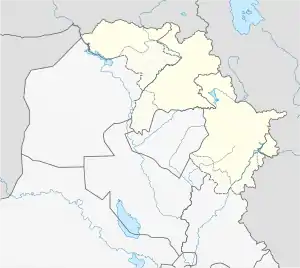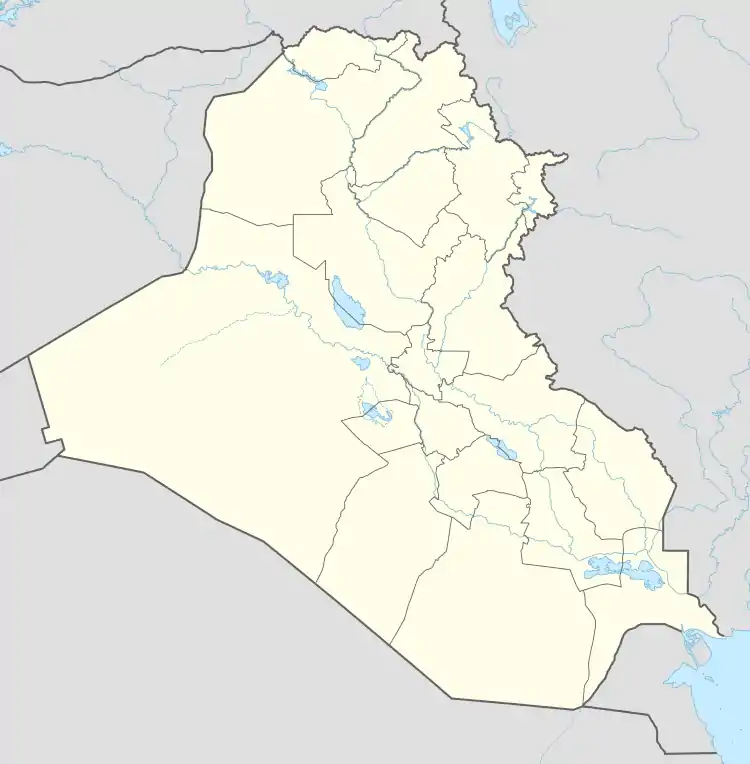Akre
Akre or Aqrah (Kurdish: Akrê ,ئاکرێ,[2][3] Arabic: عقرة,[4] Syriac: ܥܩܪ, romanized: Aqra')[5] is a city in the Duhok Governorate, Kurdistan Region in Iraq.[6] Akre is known for its celebrations of Newroz.[7][8]
Akre | |
|---|---|
City | |
.jpg.webp) | |
 Akre location of Akre  Akre Akre (Iraq) | |
| Coordinates: 36°44′29″N 43°53′36″E | |
| Country | |
| Autonomous region | |
| Province | Dihok Province |
| District | Akre District |
| Government | |
| • Governor | Hunar Ismail |
| Population (2018)[1] | |
| • Total | 212,000 |
| Time zone | +3 |
Etymology
The name "Akre" stems from the Kurdish word "Agir" meaning "fire".[9]
History
The city was built in the 7th century and is one of the oldest continuously inhabited cities in the world. The Medes ruled the city from 612 to 550 BC in what is known as its golden age. Zoroastrian Prince Zand was the prince of the city.[9] In year 115, the town came under Roman control commanded by Emperor Trajan and he set up a victory statue in the city. However, the locals quickly revolted and removed the statue. In 1133, the city was invaded by Imad al-Din Zengi of the Zengid dynasty who destroyed the defense wall of the city.[10]
The city was the fief of the Kurdish Humaydi tribe since the 10th century, as such, Yaqut al-Hamawi, indicated that it was also known as ‘Aqr al-Ḥumaydiya. The 14th-century Shihab al-Umari, also noted the presence of the Yazidi Dasni tribe.[11] The decline of the Principality of Bitlis from the 1500s and 1700s allowed Bahdinan to take Akre and its surroundings. Bahdinan would however lose the town to Emir Muhammad Kor of the Soran Emirate in 1833.[12] Before losing the city, the Bahdinan era of the city saw significant cultural and economic developments and constructions. The city wall was also rebuilt with alabaster. However, during the 18th century, the city fell victim to various military campaigns from Soran Emirate which ultimately captured the city in 1833. The city would be captured by the Ottomans in 1842 due to its strategic location and continued to be under Ottoman rule until 1918. During this period, it was administered as part of the Mosul Vilayet and was populated by both Christians, Jews and Muslims.[13]
Notable natives
- Dr. Widad Akreyi, award-winning international humanitarian, medical expert, author
- Ambassador Tariq Aqrawi, Former Iraqi Ambassador to UN, OPEC, Austria
- Hiner Saleem, Kurdish film director
- Yitzhak Mordechai, former Israeli General[16]
- Hoshyar Zebari, former Iraqi Foreign minister[17]
Bibliography
- Eppel, Michael (2018), The Kurdish emirates, Routledge Handbooks Online, ISBN 978-1-138-64664-3, retrieved 1 May 2020
- Ismail, Shireen Y. (2015), Promoting integrated heritage conservation and management in Iraqi Kurdistan Region applicability of values-based approach the case study of Akre and Amedy City in Duhok Province., University of Dortmund
References
- "Passport directorate in Zakho to open soon, save residents travel time". Kurdistan24. 2 December 2019. Retrieved 10 November 2020.
- "Akrê- Ji ber bordûmana Tirkiyê 12 gund vala bûne". p. ku. Retrieved 18 December 2019.
- "ئاکرێ" (in Kurdish).
- "رغم الجائحة.. نحو 700 ألف سائح دخلوا دهوك أغلبهم من بغداد ونينوى". p. ar. Retrieved 10 November 2020.
- Thomas A. Carlson et al., “ʿAqra — ܥܩܪ ” in The Syriac Gazetteer last modified December 9, 2016, http://syriaca.org/place/25.
- Denis Natali (2010). The Kurdish Quasi-State: Development and Dependency in Post-Gulf War Iraq. p. 83.
- "Fire lights the way for Kurds in Akre 'Kurdistan's Newroz capital'". Rûdaw. 21 March 2019. Retrieved 12 December 2019.
- "Kurdistan mountaineering festival returns to 'Newroz capital' Akre". Rûdaw. 22 November 2019. Retrieved 12 December 2019.
- Ismail (2015), p. 115.
- Ismail (2015), p. 116.
- James, B. “Le « territoire tribal des Kurdes » et l’Aire Iraqienne (Xe-XIIIe Siècles): Esquisse des Recompositions Spatiales.” Revue des Mondes Musulmans et de la Méditerranée 117-118 (2007).101-126.
- Eppel (2018), p. 40-42.
- Ismail (2015), pp. 116–117.
- Fuat Dundar (2012). "British Use of Statistics in the Iraqi Kurdish Question (1919–1932)" (PDF): 44. Retrieved 12 November 2019. Cite journal requires
|journal=(help) - C. J. Edmonds (1957). Kurds, Turks and Arabs, Politics, Travel and Research in North-Eastern Iraq, 1919-1925. Oxford University Press. p. 439. Retrieved 17 November 2019.
- Ham, Anthony (2010-09-15). Middle East. ISBN 9781742203591.
- http://ekurd.net/mismas/articles/misc2014/5/govt2295.htm